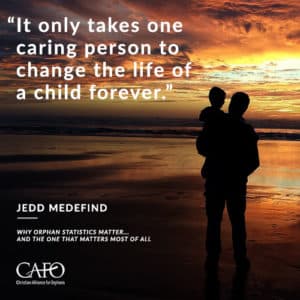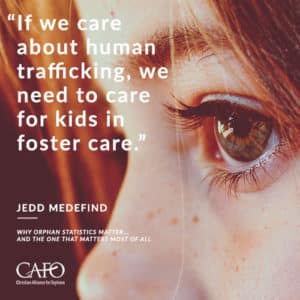Yes, it’s the day you’ve been waiting for: World Statistics Day.
It may not be a Federal Holiday…or even a cause for an office party…but statistics do matter. Accurate statistics help us to better understand our world, communicate wisely about the needs around us, and address complex situations effectively.
Mistaken or misused statistics can do just the opposite.
That’s particularly true of statistics related to orphaned and neglected children. For example, we need to know and share that a large majority of child victims of trafficking in the US come from the foster system. A single consistent, caring adult relationship can stand like a castle wall between those kids and traffickers. If we care about human trafficking, we need to care for kids in foster care.
Or consider that the oft’ quoted statistic — 150+ million orphans in the world — includes both double and single orphans. If we imagine all of these children have lost both parents, we may think we need to find 150 million new families. In fact, while millions of children classified as orphans do need new families, millions of others can be helped to thrive with a surviving parent or relative.
In short, if we are seriously about addressing problems wisely and loving people well, we need to understand good statistics and use them to guide our actions.
Admittedly, this is easier in the U.S. than in developing countries. Despite its shortcomings, data from the U.S. Adoption and Foster Care Analysis and Reporting System (AFCARS) annual report carries is highly detailed and generally accurate.
Pinning down accurate numbers globally is far more difficult. What global data does exist is notoriously limited and incomplete. (CAFO recently joined a group letter to the U.N. Statistical Commission – titled “All Children Count but Not All Children Are Counted” – urging more comprehensive collection of data related to orphans and other children without parental care.)
The shortcomings of currently-available statics certainly are big problem. But just as much, so is the misunderstanding and misuse of statistics by well-meaning advocates. There’s both a big danger and an important opportunity here:
If we are to communicate with humility, credibility, and integrity, Christian orphan advocates must both accurately understand and carefully present orphan-related statistics. Failure to do so undermines the strength of our advocacy and can misguide the actions that organizations, churches and individuals take on behalf of orphans. Meanwhile, an accurate grasp and communication of the true nature of the need provides a strong foundation for an effective, well-focused response.
So today, on World Statistics Day, CAFO is releasing the 2015 version of the CAFO White Paper, “On Understanding Orphan Statistics.”
If you are someone who desires to be an effective advocate for orphans, I’d encourage you to read it. Yes, it’s a bit wonky. But in under ten pages, you’ll encounter a trove of rich in information every orphan advocate needs to understand.
Of course, statistics certainly aren’t the end all. In fact, if we imagine that big statistics will spur the apathetic to action, we’re shooting ourselves in the foot. Unloading large numbers on even naturally compassionate people is more likely to shut them down than fire them up.
Consider, for example, the findings of the famous Rokia Study, which asked, “What is the ideal number of children to highlight if we want to spur compassionate action?” The answer: Not three. Not two. ONE. Even adding a second child to the picture tended to diminish compassionate response and (apparently) increase feelings of overwhelmedness.
Statistics matter. A lot. And if we’re going to serve vulnerable children well as advocates, we must understand statistics and use them well.
But alongside that truth, we must always hold fast to the single statistic that matters more than any other: it only takes one caring person to change the life of a child forever.



